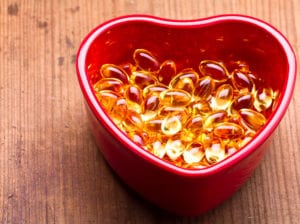Written by Jessica Patella, ND. A combination of coenzyme Q10 (needed for energy production) and selenium (protects the body from oxidative damage) improved cardiac function in patients with heart failure.
 Heart failure is a serious condition that occurs when the heart cannot pump enough blood or oxygen to support other organs in the body. The condition affects around 5.7 million people in the U.S. and costs the nation $34.4 billion yearly (healthcare services, medications and lost productivity) 1. Recent research has found that supplementing a combination of coenzyme Q10 and selenium for two years decreased the deterioration of cardiac function and cardiac death in participants with moderate heart failure 2.
Heart failure is a serious condition that occurs when the heart cannot pump enough blood or oxygen to support other organs in the body. The condition affects around 5.7 million people in the U.S. and costs the nation $34.4 billion yearly (healthcare services, medications and lost productivity) 1. Recent research has found that supplementing a combination of coenzyme Q10 and selenium for two years decreased the deterioration of cardiac function and cardiac death in participants with moderate heart failure 2.
Coenzyme Q10 (ubiquinone) is present in all cells of the body and is a major source of energy production in the cells. For this reason, it is especially important for cells in the heart, where there is a large energy requirement 2. Selenium is utilized by the enzymes that protect the body from oxidative damage. One of such enzymes is glutathione peroxidase (Gpx), which can metabolize hydrogen peroxide and reduce the risk of free radical and oxidative damage to the tissues. Past research has also shown low levels of coenzyme Q10 3 and selenium 4 in patients with heart disease compared to healthy individuals 2.
The recent research included 443 participants, with an average age of 77 years and 47% were male 2. All participants were randomly divided into either the placebo group (n=222) or the treatment group (n=221), which received 200mg per day of coenzyme Q10 and 200 micrograms per day of selenium 2. Participants were re-examined every 6 months over the 2-year period of the study 2.
Heart failure in the participants was determined by measuring N-terminal natriuretic peptide (NT-proBNP), which measures how much tension is in the wall of the heart muscle. NT-proBNP was measured at baseline and at the end of the study. Based on the baseline measurements, participants were split between 5 groups (quintiles):
- Group 1 was considered to have low heart wall tension and therefore a less severe or beginning stages of heart failure
- Groups 2-4 had moderate levels of heart wall stress and therefore moderate heart failure
- Group 5 had high levels of cardiac wall tensions and therefore a severe level of heart failure
NT-proBNP quintile categories were:
- Quintile 1: 15-104 ng/L
- Quintiles 2-4: 104.01-395.40 ng/L
- Quintile 5: 395.41-3083 ng/L)
After 2 years of supplementation, the risk of death due to cardiovascular disease was significantly lower in the treatment group (1.8%) compared to placebo (10.6%) in participants with moderate heart failure (quintiles 2-4; p=0.006). The results were not significant for those with less severe heart failure (quintile 1) or severe heart failure (quintile 5) 2. It is hypothesized that the lack of results in the severe heart failure group may be due to the fact that the cells are so severely damaged that supplementation will not help 2.
Progression of heart failure based on NT-proBNP results was also significantly reduced in those with moderate heart failure (quintiles 2-4; p=0.006) compared to placebo after 2 years of supplementation 2.
During the 2-year study, a total of 215 participants withdrew (97 people from treatment group withdrew and 118 people from placebo group), and 86 died 2. The major reason for discontinuing was the number of tablets per day to take (n=58, 13%). The only adverse side effect reported was diarrhea (n=16, 3%) 2.
In conclusion, supplementation of coenzyme Q10 and selenium reduced the progression of heart failure based on heart wall tension (NT-proBNP) and reduced death due to cardiovascular disease in participants with moderate heart failure (quintiles 2-4) 2. Future research with more people and younger participants should still be conducted, and it is desirable to reduce the dropout rate to assure that those leaving the program did not alter the results. This was the first study to evaluate the change in NT-proBNP with a combination of coenzyme Q10 and selenium 2.
Source: Johansson, Peter, et al. “Effect of selenium and Q10 on the cardiac biomarker NT-proBNP.” Scandinavian Cardiovascular Journal 47.5 (2013): 281-288.
Copyright © 2017 Informa UK Limited
Posted September 16, 2013.
Jessica Patella, ND, is a naturopathic physician specializing in nutrition and homeopathic medicine and offers a holistic approach to health. She earned her ND from Southwest College of Naturopathic Medicine in Tempe, AZ, and is a member of the North Carolina Association of Naturopathic Physicians. Visit her website at www.awarenesswellness.com.
References:
- CDC. Heart Failure Fact Sheet. https://www.cdc.gov/dhdsp/data_statistics/fact_sheets/fs_heart_failure.htm.
- Johansson P, Dahlstrom O, Dahlstrom U, Alehagen U. Effect of selenium and Q10 on the cardiac biomarker NT-proBNP. Scandinavian cardiovascular journal : SCJ. 2013;47(5):281-288.
- Senes M, Erbay AR, Yilmaz FM, et al. Coenzyme Q10 and high-sensitivity C-reactive protein in ischemic and idiopathic dilated cardiomyopathy. Clinical chemistry and laboratory medicine. 2008;46(3):382-386.
- Fairweather-Tait SJ, Bao Y, Broadley MR, et al. Selenium in human health and disease. Antioxid Redox Signal. 2011;14(7):1337-1383.
